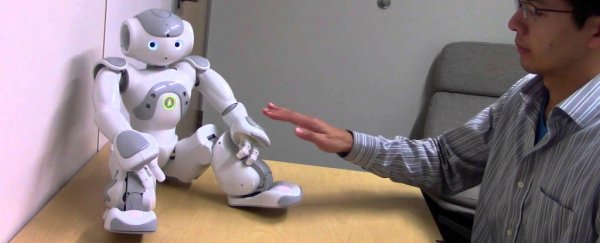Just days after we learned that a 42-year-old man in Hong Kong built a $50,000 robot that looks exactly like Scarlett Johansson ("He's banged it. You know it, I know it, everyone knows it.") a new study has proven what we've suspected all along - humans can get turned on by robots, really, really easily.
In an experiment that saw 10 volunteers touching a robot in 13 different places at its request - including the ears, hands, butt, and genital region - the results showed that touching more 'intimate' or less accessible areas led to higher physical arousal. Watch the video below, which either makes or breaks the phrase, "Touch me on my buttocks," depending on your inclination.
Now, while this doesn't mean the participants were necessarily having sexual thoughts about the robots as they touched them on the butt, it does show that humans react in similar ways when asked to touch a robot or a human in certain private areas.
The team from Stanford University found that the more intimate or less accessible a body part was perceived to be, the greater hesitation the participant showed when asked by the robot to touch it. Once contact was made, sensors revealed that the participants' sweat ducts had started filling up, and they were more alert and attentive than when asked to touch something less intimate.
Signs of physiological or emotional arousal suggest that the robot was able to provoke a response in a human when asking them to do something that's considered inappropriate or awkward.
"People feel more alert, aware or attentive (this was what we measured as physiological arousal) because they may feel that the experience is awkward or uncanny when touching 'private' rather than 'public' areas of the robot," one of the researchers, Jamy Li, told Andrew Griffin at The Independent.
"Even though they know it's a robot and not a person, the robot is giving the person a lot of social cues (speech, gesture, it also had a general human-like form) that in turn elicits a social response."
For the experiment, 10 human volunteers (four female, six male) were asked to follow the instructions of an Aldebaran Robotics Nao robot (those cute little guys that look perpetually surprised and sometimes play soccer) that had been programmed to tell participants to point to or touch 13 different parts of its body, using their dominant hand.
The other hand was resting on a sensor that measured skin conductance, which can show researchers signs that a person is being physiologically, and perhaps even emotionally, aroused.
The participants completed 26 trials in which they were asked to either point to or touch an area, after which the robot would inform them of the medical term for that part.
While pointing at body parts elicited no physiological or emotional response, when they touched the robot, the participants tended to feel something.
"[F]or 90 percent of participants, arousal increased the more 'off-limits' the body part got," Erin Blakemore reports for The Washington Post. "Touching a robot's hand or neck elicited a less significant response than touching the eye or buttocks, for example."
Not only that, but 80 percent of participants took longer to touch more 'private' parts of the robot, suggesting that they were responding to the request in a similar way that they would if a the robot were a human stranger.
The results of the experiment were presented at the 66th Annual Conference of the International Communication Association in Fukuoka, Japan, and will now need to be submitted to a journal for peer-review.
So what's the point of all this robot-touching? The fact that the participants felt weird about touching robots in their private places, but then aroused, means that humans have a hard time separating actual humans from humanoid robots under certain circumstances, and that's good news if we want to someday integrate robots into our everyday lives.
"In future, robots with human forms may assist us in personal and public spaces," the team told The Guardian. "What kinds of relationships will people develop with these robots? While they are clearly not human, social conventions such as body accessibility may apply to robots as well."
Oh, and just so we can point out the obvious, while the researchers didn't examine what happens when a robot touches humans in private places, Li told The Independent that this would "probably lead to people experiencing physiological arousal".
The future is shaping up to be so, so weird.

